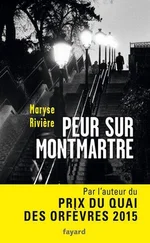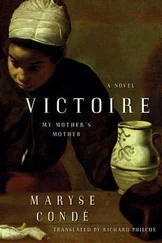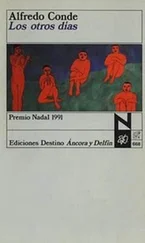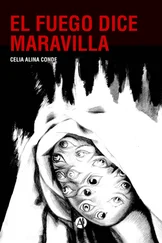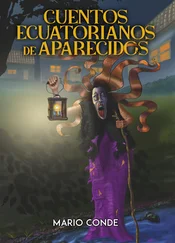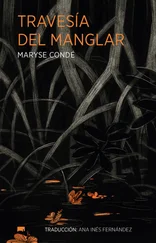They left Cayenne in total darkness under a delicate, lusterless moon that was emerging from its sleep. To reach the river, they first had to cross the banks of the Cayenne, then wade for miles with mosquitoes on their heels across a swamp, through soft mud strewn with tree trunks whose rotten stench grabbed them by the throat. It was almost daylight when they arrived at the spot where the Saramaka’s pirogue was bobbing patiently, half hidden by the thick vegetation on the bank, to which it was leashed by two stakes. A whitish vapor wafted over the surface of the water, apparently dormant under its duvet. Soon the current picked up speed, and the boat sped along like an arrow. The Saramaka and Papa Doc, perfectly at home on this shaky, precarious craft, silently manipulated their paddles, and Hakim envied them their quiet assurance. Once the river slowed down, narrowed, and they glided between two sheer cliffs. Flocks of birds flew from one wall to the other. Then the waters widened again. At noon the sun pitched itself vertically, and all at once the smoldering sky burst into flames. In agony, Hakim slaked his thirst as best he could by drinking the river’s muddy water in the cup of his hand. At one point, the Saramaka pointed out amid the mangrove trees a solitary hut standing on the bank, fringed with white sand and teeming with equally white birds.
“Mami Wata,” he cawed.
Hakim knew the legend. It existed in the Ivory Coast as well. A siren with long, shiny hair spends her days swimming in the river depths. At night she emerges and retreats to her house on the bank. There she sings song after song, so melodious they sound like a heavenly concert. But woe betide the traveler who hears her and approaches her house, for she throws herself onto him and drags him down to her watery palace, the better to devour him.
Toward the end of the afternoon they swung away from the center of the stream and finally landed. As they stepped out of the canoe, their feet sank into a sticky humus that stuck to their soles. They had to walk for a good hour before the ground became firm again. Daylight was fast fading. A bitter smell of bruised vegetation reached their nostrils as the Saramaka hacked their way through the poisonous flowers, the lianas and wild plants. At a bend in the path the village loomed up in a clearing. Hakim was not surprised to find the same charming appearance as the villages in the African bush! The ground was covered with fine sand. Large huts perched on stilts were arranged in a semicircle. All around the forest had been cleared and neatly planted with plots of tobacco and cassava. Now he was convinced it was the hand of Europe that defaced everything, blindly imposing its architecture and its discipline. There was only one dark side to the picture: surrounded by mourners, a dozen bodies lay unburied, waiting for the night to be carried to their final resting place. Without wasting any time, Papa Doc entered one of the huts. Hakim climbed into a hammock hung under a carbet. As night fell, the clouds of mosquitoes became bolder and joined the bats in flight. Insects and birds, emerging from every tree branch, chirped, warbled, and screamed. In the distance monkeys burst into laughter, while some animal howled in response. The music they composed was enough to frighten the most intrepid.
Hakim could not help shivering, as if he had caught a fever, and he wondered what had got into him to follow Papa Doc to such an inhospitable spot. Just then the Saramaka women, who had finished their cooking, brought him a copious dinner of haunch of venison and freshwater fish. Every one of them had an infant clinging to her side who was intrigued and frightened by this stranger. Hakim could not touch his meal. Instead, he greedily sucked rum from a bottle, something he seldom did.
He finally fell asleep.
Hardly had he done so than a young Saramaka woke him. In a daze, Hakim first thought it was Kwame Aniedo. The same jet-black skin, the same hair tied into small braids, above all the same smell, the smell he could not forget, a mix of sweat and vegetable fat. Then he realized his mistake. This one was darker, not so tall, slightly built, with filed teeth. Smiling, the young man placed a finger to his lips and motioned him to follow. He obeyed and stumbled to his feet. As fast as his senses returned, the more frightened he became. He was sure he would never forget that night. Sheer pandemonium! A sinister drumming was unable to cover up the screams of the women mourning. Pyres burned in front of the huts silhouetted against the dark backdrop of trees. Their eerie glow exaggerated the flickering shadows of the men and women who with heartrending wails were burning their dead. The young Saramaka left the village and fearlessly plunged into the forest. By magic, every noise stopped on their approach, and they walked on in muffled silence. Soon they reached the river, rippling with tiny iridescent waves in the darkness, and climbed into one of the small boats anchored among the mangrove trees. Straining with all his muscle power, the Saramaka paddled against the current, and after an hour they landed on the other bank. They cautiously set foot on dry land. Then suddenly the moon emerged from its hiding place and illuminated every nook and cranny of the landscape. Blinded by its glare, Hakim got the impression he was living a nightmare and thought he recognized the spot. The isolated creek. The wreath of mangrove trees. The wattle hut, its doors and windows mysteriously closed. It was the home of Mami Wata! The Saramaka, however, still smiling, motioned to him to wait and climbed back into the boat. He remained alone under this glare of moonlight, even more frightening than the dark, listening to the fading sound of water lapping as the boat disappeared into the night. He couldn’t say how long he waited, standing motionless and paralyzed on the sand. Finally the boat returned, and he could make out two shapes. Next to the Saramaka was Papa Doc who did not seem to be afraid of being where he was. The only sign something was wrong was that Papa Doc, who had been so nimble up till now, almost stumbled as he set foot on the shore. When Hakim saw his friend, his terror vanished and his serenity returned. He knew what awaited him, and it was no coincidence they were both together in this place. The two of them were going to live their final adventure.
One morning some gold diggers paddling upriver discovered the bodies of Hakim and Papa Doc near a jetty. They were scarcely recognizable, swollen by their long immersion, drained of their blood by vampire bats, and half eaten by birds of prey and ants. They came to the conclusion that the two companions must have left Cayenne by night and tried to reach one of the villages along the river for one of those illegal card games, the only means for a convict to get cash to buy cassava flour, one or two liters of rum, cans of sardines, and, if they were lucky, some black-eyed peas. Unfortunately, on the way there, their boat must have overturned. Although convicts, both Hakim and Papa Doc were baptized Christians. The gold diggers brought them back to Cayenne, where the duty of the penitentiary administration was to find them a final resting place. They planned to throw them into the communal grave. But they misjudged popular opinion.
United in life, Hakim and Papa Doc were separated in death. Nobody was affected by Hakim’s death; he was, after all, nothing but a convict like so many others, and had never made a name for himself. He seemed good only for growing flowers. Nobody understood why he was such close friends with Papa Doc and why he had followed him deep into the forest to their death. Papa Doc, however, was a living god to the hundreds of wretches he had cared for in the poor districts of Cayenne. As soon as they learned the news of his death, they marched to the penitentiary building and demanded the body. Then they carried his rough pine coffin to his shack on the Saint-François promontory. Meanwhile the Indian and Maroon villages along the rivers emptied, and long processions of canoes converged on Cayenne, swelling the crowds streaming toward the shack. Breaking with the legendary impassiveness of the Indians, the Galibi woman was weeping hot tears for her man. She was frantically talking with those of her tribe who had come to console her. There was something unnatural in his death, there was something mysterious about this business. Among the numerous Saramakas present at the wake, not one of them looked like the beanpole who had dragged Papa Doc off a few days earlier. None of them had heard of a terrible epidemic, neither on the Oyapock nor on the Approuague. The only three convicts from the French Caribbean, two from Martinique and one from Guadeloupe, obtained leave from Charvein, where the prisoners had forced the warders to fly the tricolor at half staff. They had never met Papa Doc. But his body was their property. After all, they were from the same island womb. Too bad if there was not enough rum or thick soup! They would make do with a wake, and the farewells would be heartfelt and passionate. One of them grabbed a flute, another a mandolin, yet another a guitar, and they played mazurkas and beguines from their native land. Then, with his tongue loosened by a little rum, one of them grew bold and improvised as a storyteller.
Читать дальше

